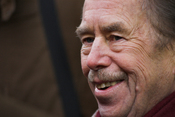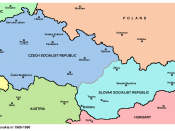Vaclav Havel: Living in Truth
No man played a bigger role in the restoration of liberal democracy in the Czech Republic (formerly Czechoslovakia) than did Vaclav Havel. To better understand this extremely influential man and what he believed in, one must recognize what he went through to achieve this mindset. Havel grew up under the two major twentieth-century varieties of totalitarianism - first Nazism, then Communism. He suffered greatly for publishing plays and samizdat� and as John Keane states, "like his counterpart Nelson Mandela, Havel is one of the only individuals to manage the transformation from political prisoner to president."� These events, among others, shaped Vaclav Havel to believe that there was a better form of government and that people should not be forced by their government to live in fear and lies.
His belief in the revolutionary strength of individuals speaking freely and "living in truth" was the fuse that set off the dissident movement in Central Europe and which led to the eventual end of communist rule in Czechoslovakia.
More important than his beliefs, and certainly more influential was the effect he had on the Czech people. Citizens in communist Czechoslovakia were not only in favor of Vaclav Havel's revolutionary beliefs of free speech and 'living in truth', but were also drawn to his personable style and dedication to the greater good of Czechoslovakia, even putting the state before his own wellbeing.
Born in 1936 to upper-bourgeois parents, Vaclav Havel from the earliest experiences in his life witnessed the negatives of totalitarianism - the government confiscated the Havel family's money and the theater they owned. This was only one of many miserable experiments in the arts of legalized terror that took place in Czechoslovakia at the time, the purpose of which was not to punish people,


